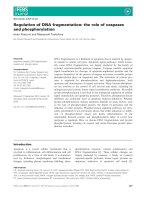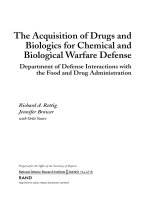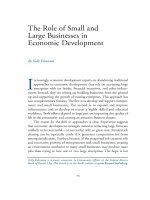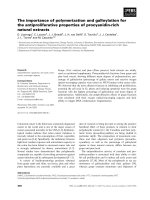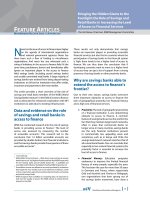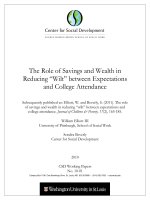The role of supervisor and student for completing a thesis
Bạn đang xem bản rút gọn của tài liệu. Xem và tải ngay bản đầy đủ của tài liệu tại đây (364.64 KB, 16 trang )
TRIBHUVAN UNIVERSITY JOURNAL, VOL.: 31, NO.: 1 & 2, JUNE/DEC. 2017
223
THE ROLE OF SUPERVISOR AND STUDENT FOR
COMPLETING A THESIS
Uma Nath Sharma*
ABSTRACT
Master’s degree students are required to write a thesis as a course
alternative to a written examination of a paper. The purpose of this article
is to understand and discuss the students’ perception on their own roles as
a thesis candidate and the role of a supervisor in accomplishing a work of
master’s thesis. For this, the candidates of master’s thesis were asked to
respond a multiple choice item like questionnaire consisting of 12 sets of
statements on the student-supervisor roles or responsibilities in three major
aspects of thesis writing, namely topic/area of study, contact/involvement
and the thesis/dissertation. The responses were analyzed descriptively using
the software package – SPSS (Statistical Package for the Social Sciences).
Analysis showed that the average students wanted to build a bridge (plan and
manage the thesis writing) together with the supervisor so that they could
cross it (accomplish the work of thesis writing). The students expected joint
role of a supervisor. The supervisor and the student are recommended to
share their expectations from each other, and build a mutual understanding
of supervisor-student roles in advance and do accordingly for the successful
completion of the thesis in reasonable time.
Key words: Supervisor, thesis, candidate, perception, role, responsibility,
hands-on supervision, systematic approach.
INTRODUCTION AND OBJECTIVE
The students of master’s degree in Tribhuvan University are required
to write a thesis as a course alternative to a written examination of a paper.
That is to say, there is a provision of carrying out a research and preparing
a report as a thesis to complete the master’s degree, though not mandatory.
More specifically, the students of M. Ed. English, who are the focus of this
study, have to write a thesis related to English language. The medium is
also English, which is a second language for Nepali students. There is no
provision of regular classes for this course except the research methodology
course in language education regarding the specified type of students (i.e.,
M. Ed. English students). Moreover, some of the students do not attend the
theory classes regularly. English, which is the medium of thesis writing, is
*
Mr. Sharma is Lecturer in Faculty of Education, Mahendra Ratna Campus,
Tahachal, TU.
224 THE ROLE OF SUPERVISOR AND STUDENT FOR COMPLETING A THESIS
not their first or dominant language though they are specializing in English
education. In this context, it is often difficult for the students to meet the
demands of the kind of writing in a thesis. Regarding the possible difficulty
the students have to face, Bhandari (2013) writes:
When the students enter into the process of thesis writing, they
find it very difficult, so many of them again go back to the
course work. Most of the students spend time not being able to
select a title for their research, and whenever they meet their
professors, seniors, or experts they ask a title for their research,
and thesis (p. 9).
The difficulty lies not only in the task of selecting a topic or title but
also in the whole process of writing a research proposal, carrying out the
research, and writing a thesis. Davis, Parker, & Straub (2012, p. 72) have
proposed ‘a systematic approach’ to writing the doctoral dissertation for
successful and timely completion of a doctoral dissertation. This approach is
equally applicable for completion of a master’s thesis in a reasonable time.
The systematic approach to completing a doctoral dissertation recommends
the following propositions:
• Structuring of the dissertation project can significantly improve
performance (by means of topic analyses, proposal documents, plans,
schedules, and so on…).
• The student has primary responsibility for the management of the
doctoral dissertation project.
• Faculty (advisor and committee) are a scarce resource.
The first proposition mainta��������������������������������������������������������������������������������������������������������������������������������������������������������������������������������������������������������������������������������������������������������������������������������������������������������������������������������������������������������������������������������������������������������������������������������������������������������������������������������������������������������������������������������������������������������������������������������������������������������������������������������������������������������������������������������������������������������������������������������������������������������������������������������������������������������������������������������������������������������������������������������������������������������������������������������������������������������������������������������������������������������������������������������������������������������������������������������������������������������������������������������������������������������������������������������������������������������������������������������������������������������������������������������������������������������������������������������������������������������������������������������������������������������������������������������������������������������������������������������������������������������������������������������������������������������������������������������������������������������������������������������������������������������������������������������������������������������������������������������������������������������������������������������������������������������������������������������������������������������������������������������������������������������������������������������������������������������������������������������������������������������������������������������������������������������������������������������������������������������������������������������������������������������������������������������������������������������������������������������������������������������������������������������������������������������������������������������������������������������������������������������������������������������������������������������������������������������������������������������������������������������������������������������������������������������������������������������������������������������������������������������������������������������������������������������������������������������������������������������������������������������������������������������������������������������������������������������������������������������������������������������������������������������������������������������������������������������������������������������������������������������������������������������������������������������������������������������������������������������������������������������������������������������������������������������������������������������������������������������������������������������������������������������������������������������������������������������������������������������������������������������������������������������������������������������������������������������������������������������������������������������������������������������������������������������������������������������������������������������������������������������������������������������������������������������������������������������������������������������������������������������������������������������������������������������������������������������������������������������������������������������������������������������������������������������������������������������������������������������������������������������������������������������������������������������������������������������������������������������������������������������������������������������������������������������������������������������������������������������������������������������������������������������������������������������������������������������������������������������������������������������������������������������������������������������������������������������������������������������������������������������������������������������������������������������������������������������������������������������������������������������������������������������������������������������������������������������������������������������������������������������������������������������������������������������������������������������������������������������������������������������������������������������������������������������������������������������������������������������������������������������������������������������������������������������������������������������������������������������������������������������������������������������������������������������������������������������������������������������������������������������������������������������������������������������������������������������������������������������������������������������������������������������������������������������������������������������������������������������������������������������������������������������������������������������������������������������������������������������������������������������������������������������������������������������������������������������������������������������������������������������������������������������������������������������������������������������������������������������������������������������������������������������������������������������������������������������������������������������������������������������������������������������������������������������������������������������������������������������������������������������������������������������������������������������������������������������������������������������������������������������������������������������������������������������������������������������������������������������������������������������������������������������������������������������������������������������������������������������������������������������������������������������������������������������������������������������������������������������������������������������������������������������������������������������������������������������������������������������������������������������������������������������������������������������������������������������������������������������������������������������������������������������������������������������������������������������������������������������������������������������������������������������������������������������������������������������������������������������������������������������������������������������������������������������������������������������������������������������������������������������������������������������������������������������������������������������������������������������������������������������������������������������������������������������������������������������������������������������������������������������������������������������������������������������������������������������������������������������������������������������������������������������������������������������������������������������������������������������������������������������������������������������������������������������������������������������������������������������������������������������������������������������������������������������������������������������������������������������������������������������������������������������������������������������������������������������������������������������������������������������������������������������������������������������������������������������������������������������������������������������������������������������������������������������������������������������������������������������������������������������������������������������������������������������������������������������������������������������������������������������������������������������������������������������������������������������������������������������������������������������������������������������������������������������������������������������������������������������������������������������������������������������������������������������������������������������������������������������������������������������������������������������������������������������������������������������������������������������������������������������������������������������������������������������������������������������������������������������������������������������������������������������������������������������������������������������������������������������������������������������������������������������������������������������������������������������������������������������������������������������������������������������������������������������������������������������������������������������������������������������������������������������������������������������������������������������������������������������������������������������������������������������������������������������������������������������������������������������������������������������������������������������������������������������������������������������������������������������������������������������������������������������������������������������������������������������������������������������������������������������������������������������������������������������������������������������������������������������������������������������������������������������������������������������������������������������������������������������������������������������������������������������������������������������������������������������������������������������������������������������������������������������������������������������������������������������������������������������������������������������������������������������������������������������������������������������������������������������������������������������������������������������������������������������������������������������������������������������������������������������������������������������������������������������������������������������������������������������������������������������������������������������������������������������������������������������������������������������������������������������������������������������������������������������������������������������������������������������������������������������������������������������������������������������������������������������������������������������������������������������������������������������������������������������������������������������������������������������������������������������������������������������������������������������������������������������������������������������������������������������������������������������������������������������������������������������������������������������������������������������������������������������������������������������������������������������������������������������������������������������������������������������������������������������������������������������������������������������������������������������������������������������������������������������������������������������������������������������������������������������������������������������������������������������������������������������������������������������������������������������������������������������������������������������������������������������������������������������������������������������������������������������������������������������������������������������������������������������������������������������������������������������������������������������������������������������������������������������������������������������������������������������������������������������������������������������������������������������������������������������������������������������������������������������������������������������������������������������������������������������������������������������������������������������������������������������������������������������������������������������������������������������������������������������������������������������������������������������������������������������������������������������������������������������������������������������������������������������������������������������������������������������������������������������������������������������������������������������������������������������������������������������������������������������������������������������������������������������������������������������������������������������������������������������������������������������������������������������������������������������������������������������������������������������������������������������������������������������������������������������������������������������������������������������������������������������������������������������������������������������������������������������������������������������������������������������������������������������������������������������������������������������������������������������������������������������������������������������������������������������������������������������������������������������������������������������������������������������������������������������������������������������������������������������������������������������������������������������������������������������������������������������������������������������������������������������������������������������������������������������������������������������������������������������������������������������������������������������������������������������������������������������������������������������������������������������������������������������������������������������������������������������������������������������������������������������������������������������������������������������������������������������������������������������������������������������������������������������������������������������������������������������������������������������������������������������������������������������������������������������������������������������������������������������������������������������������������������������������������������������������������������������������������������������������������������������������������������������������������������������������������������������������������������������������������������������������������������������������������������������������������������������������������������������������������������������������������������������������������������������������������������������������������������������������������������������������������������������������������������������������������������������������������������������������������������������������������������������������������������������������������������������������������������������������������������������������������������������������������������������������������������������������������������������������������������������������������������������������������������������������������������������������������������������������������������������������������������������������������������������������������������������������������������������������������������������������������������������������������������������������������������������������������������������������������������������������������������������������������������������������������������������������������������������������������������������������������������������������������������������������������������������������������������������������������������������������������������������������������������������������������������������������������������������������������������������������������������������������������������������������������������������������������������������������������������������������������������������������������������������������������������������������������������������������������������������������������������������������������������������������������������������������������������������������������������������������������������������������������������������������������������������������������������������������������������������������������������������������������������������������������������������������������������������������������������������������������������������������������������������������������������������������������������������������������������������������������������������������������������������������������������������������������������������������������������������������������������������������������������������������������������������������������������������������������������������������������������������������������������������������������������������������������������������������������������������������������������������������������������������������������������������������������������������������������������������������������������������������������������������������������������������������������������������������������������������������������������������������������������������������������������������������������������������������������������������������������������������������������������������������������������������������������������������������������������������������������������������������������������������������������������������������������������������������������������������������������������������������������������������������������������������������������������������������������������������������������������������������������������������������������������������������������������������������������������������������������������������������������������������������������������������������������������������������������������������������������������������������������������������������������������������������������������������������������������������������������������������������������������������������������������������������������������������������������������������������������������������������������������������������������������������������������������������������������������������������������������������������������������������������������������������������������������������������������������������������������������������������������������������������������������������������������������������������������������������������������������������������������������������������������������������������������������������������������������������������������������������������������������������������������������������������������������������������������������������������������������������������������������������������������������������������������������������������������������������������������������������������������������������������������������������������������������������������������������������������������������������������������������������������������������������������������������������������������������������������������������������������������������������������������������������������������������������������������������������������������������������������������������������������������������������������������������������������������������������������������������������������������������������������������������������������������������������������������������������������������������������������������������������������������������������������������������������������������������������������������������������������������������������������������������������������������������������������������������������������������������������������������������������������������������������������������������������������������������������������������������������������������������������������������������������������������������������������������������������������������������������������������������������������������������������������������������������������������������������������������������������������������������������������������������������������������������������������������������������������������������������������������������������������������������������������������������������������������������������teachers should be aware of the students’ expectations in their
supervisory role and relationship. Analyzing the research findings, it can
be understood that the majority of students were in favour of the neutral/
middle path regarding the supervisor-student role in almost all of the
aspects of the work of thesis writing. There was only one aspect, namely
supervisor’s role in supporting or terminating the candidature if they
thought that a student is not succeeded, whereas half of the students (10)
were against the excessive role of supervisor in terminating the candidature
if they thought a student is not succeeded as shown in Table 8. In other
words, they believed that a supervisor should support the student regardless
of their opinion of the student’s capability. It is quite natural that nobody
wants to dig their own grave. Apart from this, majority of the students had
accepted the middle path indicating that they wanted to work out the thesis
writing project as a joint venture with their supervisor. To be acquainted
with such a tendency of students in general is important or helpful for a
supervisor to understand their expectations, which could be the basis for
TRIBHUVAN UNIVERSITY JOURNAL, VOL.: 31, NO.: 1 & 2, JUNE/DEC. 2017
235
further negotiation/discussion with the students in the matter. Though some
of the students believed on the dominant role of a supervisor or of a student
as a thesis candidate in some aspects of thesis writing project, majority of
them believed on joint involvement of a supervisor and a candidate.
Thus, the results indicate that the students want to construct the
bridge of thesis writing process together with their supervisor so that they
can cross it. The results or findings of this research could be the basis for
the hands-on supervision, where “the aims and expectations of candidature
should be articulated and agreed upon by both parties [( supervisor and
candidate)] early on” (Paltridge, & Starfield, 2007, p. 39). The findings of
this research reveals that the expectations of thesis candidates in general,
which a supervisor should be familiar with. However, the findings of
this study cannot be generalized to each individual. Moreover, thesis
supervising usually does not take place in group unlike teaching. Therefore,
a supervisor should develop a questionnaire of their own to find out the
student’s expectations or perceptions regarding the supervisor-student roles
or responsibilities in the accomplishment of a thesis. Then the supervisor
can also share his/her expectation on the matter. They should discuss
substantially “to build a trusting and respectful relationship” (Paltridge
& Starfield, 2007, p. 39), and also to build a mutual understanding of
supervisor-student roles in advance for the successful completion of the
thesis in reasonable time.
CONCLUSION
The bridge for a student to cross in course of the journey of their
work of thesis writing should be jointly constructed by the student and the
supervisor on the basis of the mutual understanding of their respective roles
in the completion of the work built in advance. In other words, the task of
writing a thesis is a difficult time-consuming and effort-demanding journey
that requires joint involvement of the supervisor and thesis candidate with
pre-determined roles and responsibilities.
236 THE ROLE OF SUPERVISOR AND STUDENT FOR COMPLETING A THESIS
APPENDIX
Topic/area of study
Set
No.
Statements and Code Numbers
1
It is the supervisor’s responsibility to select a topic. -1
The supervisor is more responsible than the student to select a topic. - 2
Both the student and supervisor are equally responsible to select a topic.
-3
The student is more responsible than the supervisor to select a topic. - 4
It is the student’s responsibility to select a topic. - 5
2
It is up to the supervisor to decide which theoretical frame work is most
appropriate. -1
The supervisor should decide which theoretical frame work is most
appropriate, but the student should be convinced. - 2
There is equal role of the student and the supervisor in determining the
appropriate theoretical framework. - 3
It is the student’s right to choose a theoretical framework, but the
supervisor should be convinced. - 4
A student has the right to choose a theoretical standpoint even if it
conflicts with that of the supervisor. - 5
3
A supervisor should direct a student in an appropriate programme of
research and study. - 1
A supervisor should direct a student in an appropriate programme of
research and study considering the student’s needs as far as possible. - 2
A student should be able to work out a schedule and research programme
appropriate to their needs. -3
4
A supervisor should ensure that a student has access to all necessary
facilities, materials and support. - 1
A supervisor cannot ensure but should help the student to find the
necessary facilities, materials and support to complete the research. - 2
The student must find the necessary facilities, materials and support to
complete their research. -3
Contact/involvement
Set
No.
Statements and Code Numbers
5
Supervisor-student relationships are purely professional and personal
relationships should not develop. -1
Close personal relationships are neither essential nor harmful for
successful supervision. - 2
Close personal relationships are essential for successful supervision. - 3
TRIBHUVAN UNIVERSITY JOURNAL, VOL.: 31, NO.: 1 & 2, JUNE/DEC. 2017
237
6
A supervisor should initiate meetings with a student. - 1
Either a supervisor or a student can initiate meetings. - 2
A student should initiate meetings with their supervisor. - 3
7
A supervisor should check constantly that a student is on track and
working consistently. - 1
A supervisor should give suggestion, but should not interfere to the
student in their way and pace of work. - 2
Students should have the opportunity to find their own way without
having to account for how they spend their time. - 3
8
A supervisor should terminate the candidature if they think a student
will not succeed. - 1
A supervisor can deny supervising the candidate, but should not
terminate the candidature if they think a student will not succeed. - 2
A supervisor should support the student regardless of their opinion of
the student’s capability. - 3
The thesis/dissertation
Set No.
Statements and Code Numbers
9
A supervisor should ensure that the thesis is finished within the
allocated time. - 1
Time factor should be negotiable between the supervisor and the
candidate. - 2
As long as a student works steadily they should be able to take as
long as they need to finish the work. - 3
10
A supervisor has direct responsibility for the methodology and
content of the thesis. - 1
Both the student and the supervisor are equally responsible for the
methodology and content of the thesis. - 2
A student has total responsibility for ensuring that the methodology
and content of the thesis are appropriate to the discipline. -3
11
A supervisor should assist in the actual writing of the thesis if the
student has difficulties, and should ensure that the presentation is
flawless. - 1
A supervisor is also at least partially responsible for the flawless
presentation of the thesis. - 2
A student must take full responsibility for presentation of the thesis,
including grammar and spelling. - 3
12
A supervisor should insist on seeing drafts of every section of the
thesis in order to give students feedback on their work. - 1
A student should ask for feedback on their work even if the supervisor
does not insist on. - 2
It is up to a student to ask for feedback from their supervisors. - 3
238 THE ROLE OF SUPERVISOR AND STUDENT FOR COMPLETING A THESIS
WORKS CITED
Bhandari, B. M. (2013). Where do titlies come from? Tribhuvan University
Journal , 28 (1-2), pp. 9-16.
Davis, G. B., Parker, C. A., & Straub, D. W. (2012). Writing the doctoral
dissertation: A systematic approach. New York: Barrons.
Paltridge, B., & Starfield, S. (2007). Thesis and dissertation writing
in a second language: A handbook for supervisors. London:
Routledge.
Single, P. B. (2010). Demystifying dissertation writing. Virginia: Stylus
Publishing.
